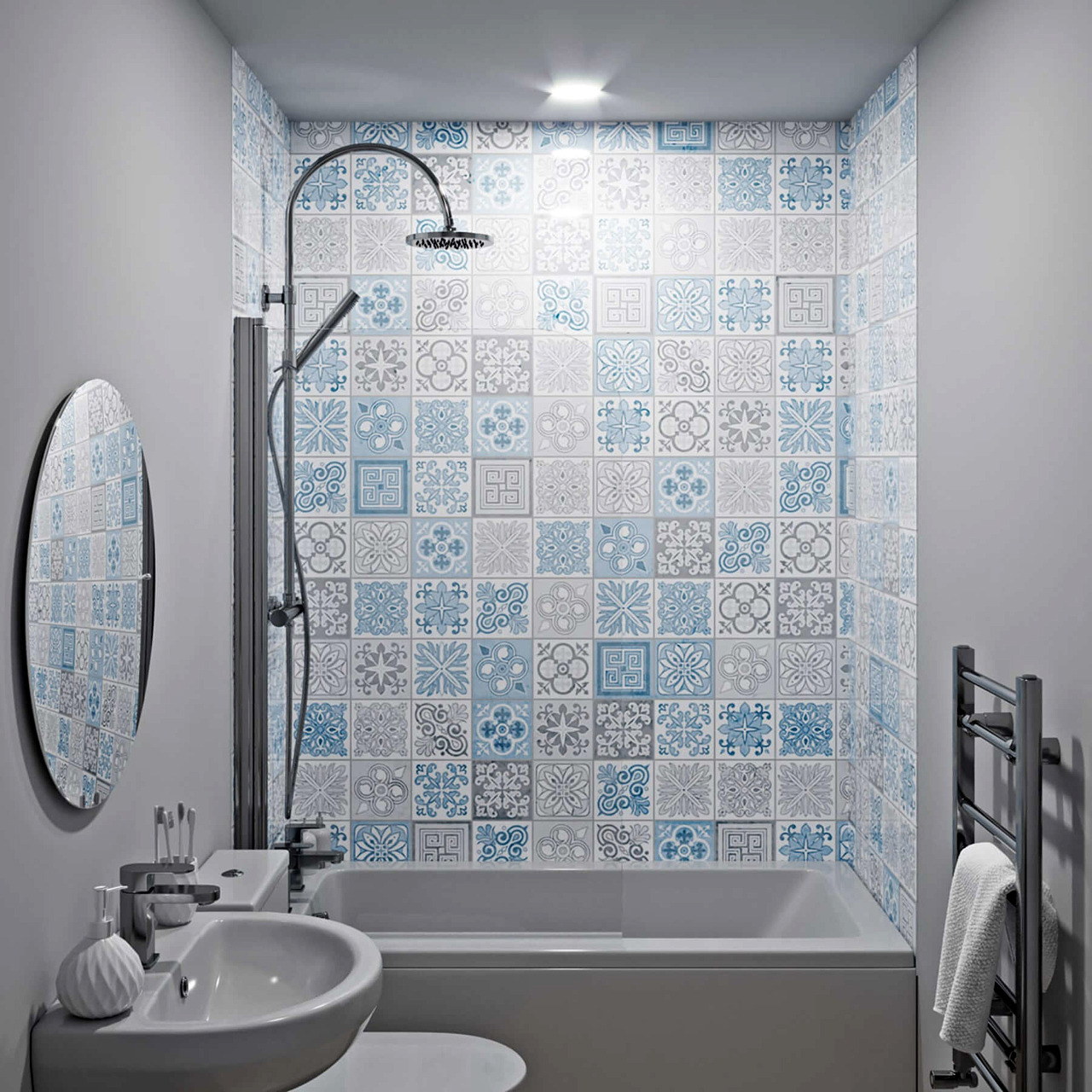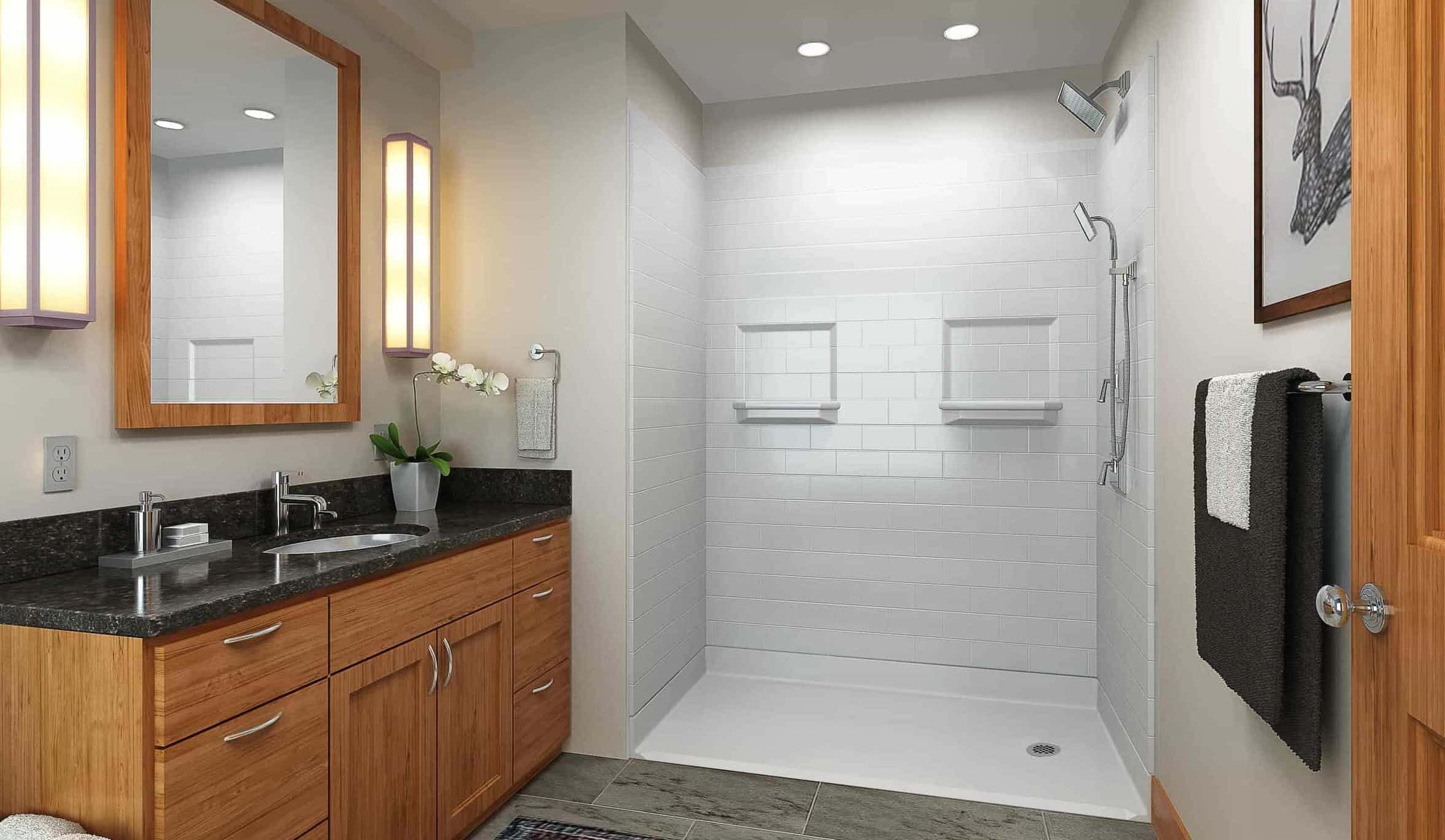Types of Shower Wall Materials: Types Of Bathroom Shower Walls

Types of bathroom shower walls – Selecting the right material for your shower walls is crucial for both aesthetics and functionality. Various options are available, each with its unique advantages and drawbacks. Understanding these materials will help you make an informed decision that suits your needs and preferences.
Acrylic Shower Walls
Acrylic is a popular choice for shower walls due to its affordability, ease of installation, and low maintenance. It is a non-porous material, making it resistant to mold and mildew growth. Acrylic shower walls are also lightweight and easy to cut and shape, allowing for customization and seamless integration with existing bathroom fixtures.
Bathroom shower walls are available in a variety of materials, including tile, acrylic, and fiberglass. For a classic and timeless look, consider black and white house interior tile. White subway tile is a popular choice, but you can also find black penny tile or hexagonal tile for a more unique look.
Acrylic and fiberglass shower walls are a more budget-friendly option, and they come in a variety of colors and patterns.
However, acrylic is not as durable as other materials and can be prone to scratches and dents. It can also fade over time, especially when exposed to direct sunlight. Additionally, acrylic shower walls may not be suitable for high-traffic areas or for those seeking a more luxurious look.
Tile Shower Walls
Tiles are a classic and versatile option for shower walls, offering a wide range of colors, patterns, and textures. Ceramic and porcelain tiles are popular choices due to their durability, water resistance, and ease of cleaning. They are also resistant to heat and moisture, making them suitable for steamy showers.
However, tile installation is more complex and time-consuming than other materials. Tiles require proper grouting and sealing to prevent water damage. Additionally, tiles can be more expensive than other options and may require professional installation.
While selecting the perfect shower wall for your bathroom, it’s important to consider the overall aesthetic of your home. If you have a wooden house interior, for instance, you might opt for a rustic tile that complements the natural warmth of the wood.
Wooden house interiors often feature exposed beams and vaulted ceilings, so a shower wall with a similar texture can help create a cohesive look. No matter your style, there are endless possibilities when it comes to choosing the perfect shower wall for your bathroom.
Stone Shower Walls
Stone shower walls exude luxury and sophistication. Natural stones like marble, granite, and travertine are highly durable and resistant to wear and tear. They create a timeless and elegant look that can enhance the overall value of your bathroom.
However, stone shower walls are significantly more expensive than other materials and require professional installation. Stone is also porous and requires regular sealing to prevent water absorption and staining. Additionally, stone can be cold to the touch, which may not be ideal for all users.
Glass Shower Walls
Glass shower walls are a modern and stylish option that creates a spacious and open feel in the bathroom. They are made from tempered glass, which is highly durable and resistant to breakage. Glass shower walls allow for natural light to enter the shower, making it feel larger and brighter.
However, glass shower walls require regular cleaning to prevent water spots and soap scum buildup. They can also be more expensive than other materials and may not be suitable for all bathroom layouts. Additionally, glass shower walls may not provide as much privacy as other materials.
Design Considerations for Shower Walls

Designing shower walls involves careful consideration of several factors to achieve a functional and aesthetically pleasing space. From selecting materials that complement bathroom fixtures to choosing colors and patterns that enhance the overall ambiance, the design of shower walls plays a crucial role in creating a cohesive and inviting bathroom environment.
Bathroom Size
The size of the bathroom significantly influences the design of shower walls. In smaller bathrooms, it’s essential to optimize space by choosing materials that create an illusion of spaciousness. Light-colored tiles, such as white or beige, can make the room feel larger. Additionally, using large-format tiles with minimal grout lines helps create a seamless and expansive look.
Colors and Patterns
The aesthetic appeal of shower walls is greatly influenced by the choice of colors and patterns. Neutral colors like white, gray, or beige provide a timeless and versatile backdrop for various bathroom styles. Bold and vibrant colors, such as blue or green, can create a focal point and add a touch of personality. Patterns, such as stripes or geometric designs, can add visual interest and create a unique atmosphere.
Complementing Bathroom Fixtures
To achieve a cohesive bathroom design, it’s essential to choose shower wall materials that complement the existing fixtures. For example, natural stone tiles, such as marble or granite, pair well with classic or traditional bathroom styles. Porcelain or ceramic tiles offer a wide range of colors and patterns, making them suitable for both modern and contemporary bathrooms. Metal accents, such as brushed nickel or chrome, can add a touch of sophistication and complement metallic fixtures in the bathroom.
Installation and Maintenance of Shower Walls

Installing and maintaining shower walls is essential to ensure their longevity and functionality. The process varies depending on the material used, but some general steps apply to most types.
Acrylic Shower Walls Installation
Installing acrylic shower walls involves the following steps:
- Prepare the walls by removing any existing fixtures or materials.
- Install a backer board to provide support for the acrylic panels.
- Cut the acrylic panels to size and dry-fit them to ensure a proper fit.
- Apply adhesive to the back of the panels and press them into place on the backer board.
- Seal the joints between the panels with caulk or sealant.
- Install trim around the edges of the walls to finish the installation.
Installation Cost Comparison, Types of bathroom shower walls
The cost of installing shower walls varies depending on the material used and the size of the shower. Here is a table comparing the approximate installation costs of different materials:
| Material | Installation Cost |
|---|---|
| Acrylic | $200-$500 |
| Tile | $500-$1,500 |
| Fiberglass | $300-$700 |
| Cultured Marble | $600-$1,200 |